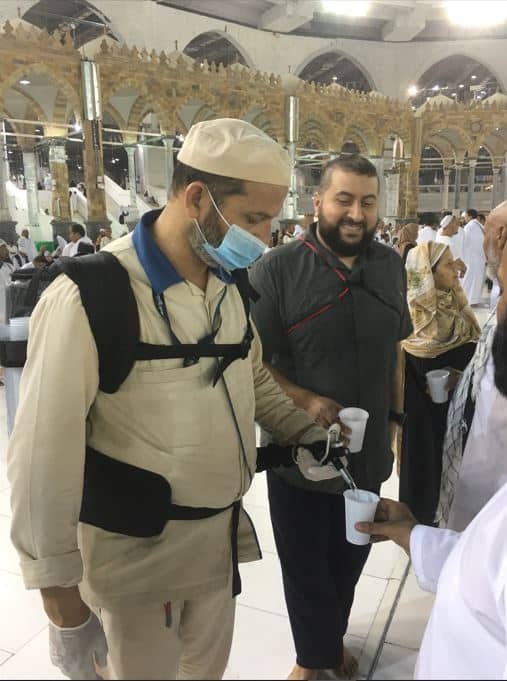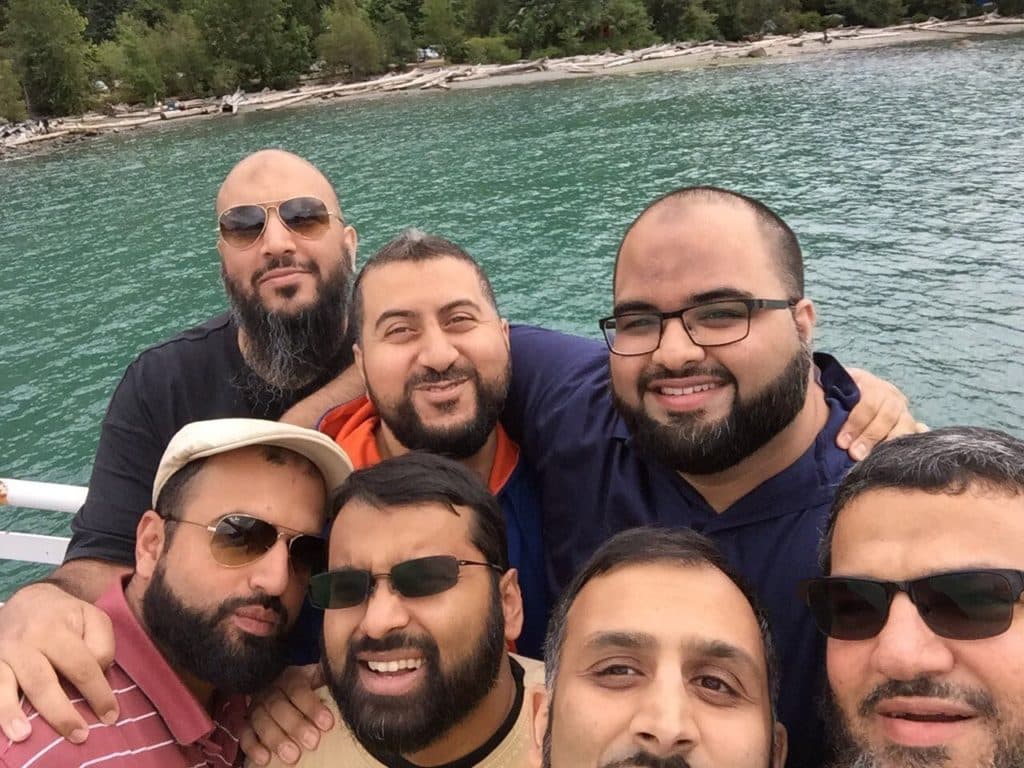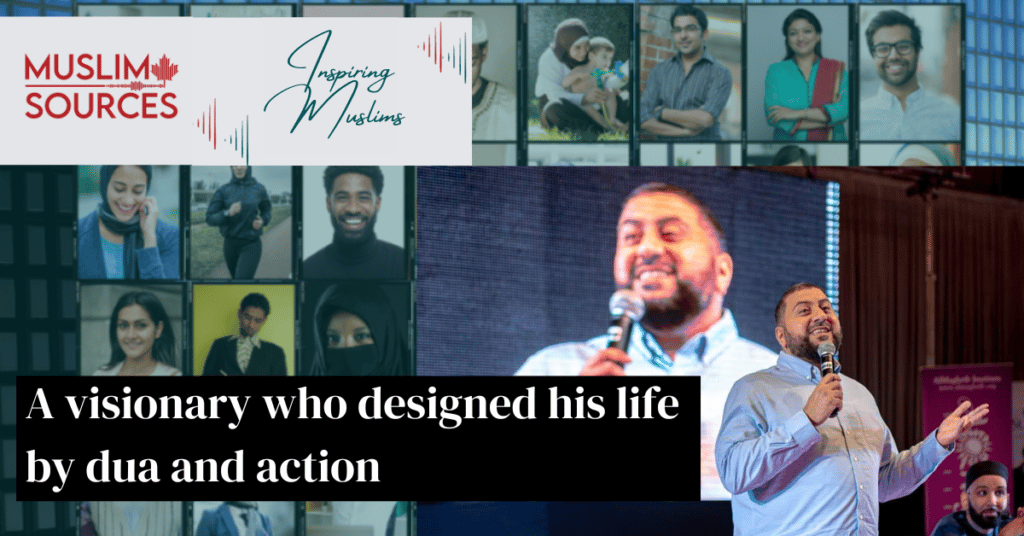A tribute to Shaykh Muhammad Alshareef, an inspiring and influential Canadian Muslim who was a teacher and mentor to many.
Inspiring Muslims is a new series that will be run by Muslim Sources to bring out stories that will inspire and uplift our community.
Thanks to years of not seeing ourselves represented in the profiles, features and stories of successful people in the mainstream narrative, we as the Muslim community find it harder to dream big and aim high. Showcasing these success stories and inspiring journeys is pivotal to Muslim representation and to the success of our own community members.
We want to create a space to tell the stories of inspiring changemakers and trailblazers who thrive while embracing their faith and identity. These are our stories, by us and for us. Read more about the series here. If you wish to collaborate with us on this series please reach out to us at info@muslimsources.org
Shaykh Muhammad Alshareef (May Allah have mercy on him) passed away suddenly in Dubai on July 21, 2022 leading to an outpouring of shock and grief from Muslims all over the world. I wanted to feature him for our new “Inspiring Muslims” series that was already in the works, since he was definitely an inspiration for me throughout other aspects of my life and for this work in particular. It was his courses that motivated me to start taking action to work on the idea for this project that I had just been sitting on for a while.
Quotes and anecdotes have been taken from an online tribute organized by DiscoverU and AlMaghrib, online posts and some of Shaykh Muhammad’s online classes and have been verified by one of his colleagues and close friends. Special thanks to Noor Syed for verifying the facts and sharing photos.
The first time he met him, he remembers a tap on his shoulder. He turned back to find a young 20-something Muhammad Alshareef smiling at him.
“Abdulbary, how would you like to work for me?” He remembers the question with a smile.
“What are you talking about?” young Abdulbary Yahya scoffed in reply. “Who are you?”
They were both undergraduate students who had just started a competitive degree at the Islamic University of Madinah. Young Muhammad went on to explain his vision of bringing the education they were obtaining in Madinah to the West and making it accessible to the average Muslim who was busy with school and work and did not have the time and resources to dedicate years to studying Islam in another country.
“From the very beginning he was taking notes and I know that…they weren’t notes about the class or the Arabic class that we were in at that time. He was planning—so far ahead. He was always thinking. He was already thinking…ok, where can I find teachers?” laughs Shaykh Abdulbary talking about his experiences with Shaykh Muhammad Alshareef during an emotional online tribute organized for him by his colleagues and students after his sudden passing on July 21, 2022 without any prior illness.
Many of the other students at that time including prominent scholars like Shaykh Yasir Qadhi, Shaykh Yasir Birjas and Shaykh Abu Eesa Naimatullah, remember joking about this young man with his “grandiose ideas” and his requests to hire them for his institute.
“We’re all struggling, poor undergraduate kids, we don’t have jobs, we don’t have careers and he is already hiring people,” Shaykh Yasir Qadhi recalls with a laugh.
“He wasn’t just a dreamer, he was a visionary,” says Shaykh Yaser Birjas fondly. “I can see that the man was really light years ahead. He was seeing it, he wasn’t just dreaming it. He was seeing it and that’s just something that was unique about Shaykh Muhammad (rahimahullah—may Allah have mercy on him) that he was really able to see things that we were not able to see.”
After completing his degree in Islamic law from the Islamic University of Madinah in 1999, Shaykh Muhammad Alshareef who had grown up in Winnipeg returned to Canada and then founded AlMaghrib Institute in 2002 in Houston, Texas while still in his 20s. With AlMaghrib Institute, he pioneered innovative methods of teaching Islam which included offering double weekend seminars in engaging and fun ways that were very different from the traditional methods of Islamic education at that time. Most Islamic education at that time in the West took place in mosques governed by traditional “gate keepers”, often in Arabic and other languages.

Today, AlMaghrib has a presence in over 40 cities around the globe and serves over 200,000 students, being the platform gathering prominent scholars like Shaykh Yasir Qadhi, Shaykh Abdullah Hakim Quick, Shaykh Waleed Baysouni, Shaykh Yaser Birjas, Shaykh Omar Suleiman, Ustadha Yasmeen Mogahed, Ustadha Taimiyyah Zubair and others. Shaykh Muhammad Alshareef was also on the list of the world’s 500 most influential Muslims, a compilation by the Royal Islamic Strategic Studies Center in Jordan.
“Honestly, Muhammad Alshareef is like the Steve Jobs of Dawah (Islamic education),” says Shaykh Yasir Qadhi. “That’s the way I view him. He understood that our Muslim communities in this world and this globe, they don’t need the type of education we got back in Madinah and Al-Azhar, they need something that will boost their faith, draw them close to Allah (swt) and in order to do that we’re going to have to think outside the box.”
When Shaykh Muhammad Alshareef was introducing new practices and techniques to teaching Islam in the early 2000s he faced a lot of criticism and backlash, but colleagues remember him as being unfazed and confidently shrugging off criticism. Many of the techniques he used were later implemented by countless other organizations and institutes.
“Every institute in the Western world owes a lot (to him),” says Yasir Qadhi. “He is the first person to come and revolutionize in that manner.”
He was also the first to introduce Islamic lectures in professional CDs with beautifully designed covers, a concept that was unknown at that time when Islamic education was limited only to small gatherings and speeches at the community mosques. His seminars were also the first to have captivating professionally designed flyers and slogans that attracted young Gen Xers and Millennials at that time.
“With his motto: ‘If McDonald’s can do it for burgers, we can do it for Islam’ the whole Dawah scene was revolutionized,” wrote his colleague and close friend Shaykh Navaid Aziz in a Facebook post he wrote about him years ago.
“There was a time when Shaykh Muhammad Alshareef’s CDs were the greatest thing that was out there,” recalls Shaykh Omar Suleiman talking about the influence Shaykh Muhammad had on him.
And Shaykh Muhammad wasn’t someone to take credit for all of this. Most Muslims have heard of other scholars like Shaykh Yasir Qadhi, Shaykh Omar Suleiman, Shaykh Yaser Birjas etc more than they had heard of him.
“Because he empowered us, he put us into the limelight,” says Shaykh Yasir Qadhi calling him the “behind the scenes mover and shaker”. “He realized we have a role to play and he facilitated us to get to that role. He facilitated us to build that infrastructure. Never before in Western history had so many scholars of different backgrounds come together on one platform – that’s what made AlMaghrib so strong. You know what was the glue that we needed? We needed Muhammad Alshareef.”

“Shaykh Muhammad wasn’t in the business of building classes and programs,” says Razia Hamidi, who worked with him in his Islamic personal development organization, DiscoverU that he established after stepping away from day to day responsibilities at AlMaghrib Institute. “He was in the business of building people.”
“One of the signs of a true leader is that they want their students to exceed them. He was about empowering all those around him,” she says.
Most of his colleagues, friends and students mention how he showed genuine care and concern that is rare to find in people today, always encouraging them to be better versions of themselves and staying clear of sectarianism, division and any talk that did not concern him.

But life wasn’t just work and classes for him either. His colleagues and friends mention how each of them got to enjoy personal time and travels with him. From hiking in the Swiss Alps, maneuvering the mangrove jungles in Malaysia, watching the Northern lights in Norway, bathing in the Belgian hot springs, sampling different cuisines and playing escape rooms in Dubai, he enjoyed a range of different activities with his closest friends—the closest of which included Shaykh Waleed Hakeem, popularly known as the “travelling imam” who says he travelled through 87 cities with him only in the last five years. Shaykh Muhammad Alshareef also had a loving relationship with his wife and four children, the youngest of which is three-years-old. And as he always taught his students, throughout all those experiences and roles, he was “always keeping Allah in the equation”. Friends have stories of him raising his hands in dua (prayer) while watching the Northern lights, not missing any of his prayers while traveling, doing a random act of charity and always offering love and support to anyone he met.
If there is a common thread you can glean from his short life, it is Barakah – the Islamic concept of a special abundance that comes from Allah. In his 46 years on this Earth, he was able to touch the lives of thousands of people across the globe, establish two legacy organizations, lead Hajj groups for close to 25 years, memorize Quran, run countless courses, programs and coaching sessions and be the mobilizing agent behind numerous businesses, programs, organizations and institutes in the Muslim space – even those extending to far off countries like Austria and Japan.
There were a few secret ingredients to this life with Barakah. His father Ustadh Helmy Alshareef, former president at a Winnipeg mosque, without hesitation says the foundation to this life was Salatul Fajr, the early morning prayer. He says when Shaykh Muhammad was a child and he was the president of the mosque in Winnipeg, he would wake his son up at 3.30am in the below freezing winters of Winnipeg and together they would shovel the snow from the pavement to make way for people to come for the prayer.
Colleagues and students will tell you that another one of those special ingredients was how he lived his life by dua and action. One of his most popular programs with DiscoverU is the Visionaire program in which he taught people to design their life by dua, an offshoot from his own journey with dua.
“He designed his life,” says Shaykh Ammar Alshukry talking about his entire journey from planning and founding AlMaghrib and then going on to start DiscoverU. “Life wasn’t just something that happened to him.”
Every six months he would sit down and audit his life, think deeply about what he wanted in his life and then spend the next six months making dua for it and putting in the effort towards those goals. He used to call it the Visionaire lifestyle and taught it to his students for the past 10 years, often with students coming back year after year to plan their duas before the last 10 nights of Ramadan.
“That’s incredible intentionality,” says Shaykh Ammar. “And that’s really, really beautiful and a great lesson for a person to absorb in their life from Shaykh Muhammad.”
Shaykh Muhammad would often mention how even the concept of Islamic education through webinars—what began to be called “ilminars”—was an answer to a dua he made of wanting to teach people around the world while not having to leave his own family and young children.
Everyone who even briefly interacted with him felt like they were connected to him and that he cared for them at a personal level. His students remember him for encouraging them to excel in whatever they do. Some of the common phrases his students and colleagues hold on to from him include: “Never lower your standards, but raise your dua”, “Who stands before a King and asks for a penny?”, “Give your excuses a black eye” and “Excellence is never the result of an accident, you must engineer it!”.
His life is a testament to his relationship with dua. He connected people to dua and to Allah with dua and knowledge.
His closest friends say he would often make dua to die while doing the best deed and to be taken back during prayer and that is how he passed away: while performing Maghrib prayer on a Thursday evening in Dubai.
Two years before this, while teaching a Visionaire course to his students, he shared why he always continued to make dua, even when he felt grateful to Allah to have all that he had asked for.
“I thought to myself what if I just stop making dua—not stop making dua, obviously I would make dua—but like there is nothing that I need, there’s nothing that I want, I don’t really care. So, I thought to myself, what if I just do a Visionaire or if I just skip it?” he said. “And I realized that the joy is not even in the things that you are making dua for, the joy is the dua itself. The joy is to have….it’s almost like the things that you want… like it’s an excuse to make that connection with Allah with dua. It’s like O Allah give me this dream car, but actually I just want to make dua to you. And I want to communicate with you with something that I care for, but You are the end goal and the dua is the end goal. It’s not the stepping stone to that goal. The car is not the end goal, the house is not the end goal, making dua is the end goal and having something to make dua for. And after that year I never allow myself to not have duas, like I just gotta keep coming up with duas because this is what my life is about, or what a Muslim’s life is about, is ‘Worship your Lord until you attain certainty, until you die’ (Quran 15:99),” he said quoting a popular verse of the Quran.
It appears to be the perfect verse symbolizing his life.

